| |

|
 | | | Mother figure or femme fatale? Paulus Manker
Although she was probably happy during the time she was together with her men, the remainders of that relations were not of particular happiness for her. That counts for baby Martin, who died as a child of seven months, that counts for Manon, the young angel, who died in her early twenties, then the abortion of Kokoschka´s baby, and Mahler´s first daughter died at the age of five. It was not exactly a very pleasant part in her life that remained from the semen of the geniuses. Joshua Sobol
Of course children mortality in those times was very high. And we know now that Diphterya which killed her first daughter, Maria Anna, would not kill her daughter nowadays. One would treat it with antibiotics, and that would be finished all. Polyomyelitis, which killed Manon Gropius, would not even occur today. That was part of the fate of many people who only managed to have one child out of four remaining alife. So it was with Alma, too. But Alma was not a great mother, that is clear. She did not care very much about her children. We hear that Anna, Mahler´s second daughter, the only one who survived, and reached old age, didn´t admire her very much. She does not speak about Alma with great enthusiasm as a mother. And we know that, when Baby Martin died, Alma did not come even for the funeral. She abandoned him. She could not cope with feelings of pain. She was weak in that sense, she could not cope with suffering. You could say that it was not motherly care that made of her the figure she was. It was some other kind of femininity, which you could describe as very strong eroticism, very violent sexuality seems to me to be the case. Very, sometimes contradictory movements in her psyche, very fast transitions of mood. From enthusiasm to cruelty, from being with someone to betraying him. Faithfulness was not exactly her cup of tea. So, in all that senses she is a very dramatic feminine character.
| | 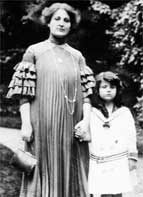 |  | 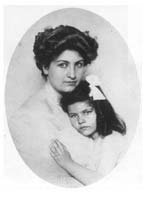 |  | | 
Alma with her daughter Anna Mahler
| | | | Paulus Manker
For Alma´s men it was always a catastrophe when the children vanished Alma had given birth to, because they were the last and utmost prove of their common love. For Mahler it was a catastrophe to loose his first daughter, and the catastrophe for Kokoschka was that he so desperately wanted her to keep the baby which Alma aborted then, as a prove that their love was eternal, and she was going to stay with him forever. And Gropius´s daughter Manon was the utmost prove of Alma´s ability to create an angel, as Alban Berg put it when he dedicated his violin concerto to Manon, "to the memory of an angel". Joshua Sobol
The men probably wanted to possess Alma. And one of the symbols of possession is always when the woman is giving birth to a child with the offspring of the men. But Alma was not cooperative in that sense. She did not like that idea that she should be possessed through her children. That´s why one has the impression that when she got pregnant she was not attached to that pregnancy, she was not attached to the babies, and she did not want to be possessed through the children. And she got pregnant probably very easyly, with Kokoschka it happened she said that whenever he passed by near her, she got pregnant.
Only with Manon the story is different, because Manon was so beautiful in her eyes (and we also have desciptions of her by Canetti), and Manon was probably really a very charming creature. But I think that Alma romanticized Manon´s beauty also. She made of it the symbol of perfection which was the outcome of her perfect physical relationship with Gropius, with an "Aryan God", as she has put it. And she put herself for an Aryan goddess, of course. And Manon was the outcome, and that was an achievement of perfection, of beauty. That´s what she attaches to Manon. I don´t know how much she was in love with Manon, I wonder. Of course she was shattered by Manon´s death, but the words she is using about Manon, and the way she desribes even Manon´s death, it remains in the realm of the beautiful, everything was beautiful, and she never speaks really about pain there. I don´t find an expression of pain when it happens. Nothing shatters her in the death of others. That´s how she reacts to Mahler´s death, and how she reacts later to Werfel´s death. She overcomes it, she survives it very easyly. Which is a sign of her vitality. And she survives the death of her children. Nothing seems to shatter her. So I have seen in her a kind of animal energy, animal mentality. And something that maybe explains what made her such a powerful woman in the lifes of her men.
| | 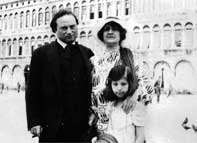 |  | 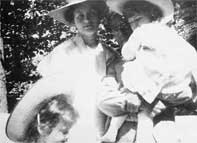 | 
Alma with Franz Werfel and Manon on St. Mark's square in Venice
Alma with Gustav Mahler and their daughters Maria and Anna
| | | I also have the impression that she sometimes played roles, and she enjoyed playing roles. From the beginning, already in her adolescence, when Gustav Klimt was running after her to Venice in order to get a kiss from her, she did so. From the moment that some famous persons in Vienna gave her the feeling that she was going to be probably a femme fatale. Finally she played that role. She couldn´t resist it, I think.
| | 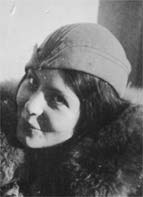 |  | Manon Gropius | | | |
